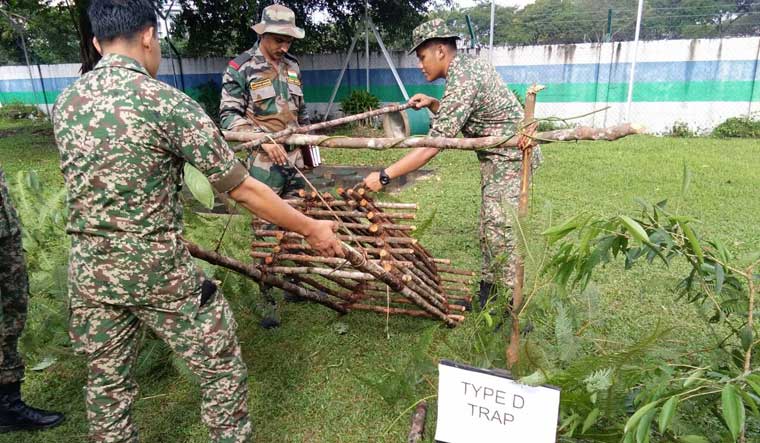How many armies can claim to have scored decisive military victories over guerillas and insurgents? You can count them on your fingers, for anti-guerrila wars have almost always ended either in defeat of conventional armies or in political settlements.
One army that can claim to have scored a complete military victory over an irregular adversary is the Malaysian Army. Though a small force of about 80,000 officers and men, they still carry, and have since refined, the lessons and tactics they developed while fighting the Malayan Emergency of the 1950s.
Currently, about 90 troopers and sappers from 4 Grenadiers and 3 Engineer Regiment of the Indian Army are jungle-training with the Malays in the first ever Indo-Malaysian exercise. They are learning how to make meals out of jungle plants and animals, how to make fire out of bamboo reeds, and how to live and fight in the jungle terrain where guerillas hide, strike and hide again.
The Malays have a lot to teach the Indians in the two-week Harimau Shakti 2018 (Harimau is Malay word for tiger), the first phase of which started on April 30 at Wardieburn Camp, Kuala Lumpur. “The key to jungle operations is the ability to survive in the testing jungle conditions, making use of the available resources,” informed Col. Aman Anand, the Indian Army spokesman from Wardieburn Camp. “Various techniques of survival in jungle being practised by Malaysian Army was demonstrated. The officers and NCO instructors of Malaysian Army explained the various aspects including pitching of hammocks, construction of jungle huts, employment of booby traps and animal traps.”
What impressed the Indians most was how the Malay troopers light fire using a unique sponge-like material collected from the bark of a tree. This material, taken from the fishtail palmtree can be used for lighting fire even in pouring rain. They also showed how to survive in the jungle “using locally available resources and cooking of food with local ingredients. The repository of knowledge on survival skills and the vast operational experience in jungle operations of Malaysian Army was evident in these interactions,” said Col. Anand.
The Malays had their anti-guerilla experience under the British during what came to be called the Malayan Emergency of 1948-60, which was actually a national liberation war. It was described as an 'emergency' because insurers would not have compensated plantation and mine owners if it had been labelled a 'war' or 'insurgency' which it was.
Malaysia, then called Malaya, was a British colony, when the Malayan National Liberation Army (MNLA), the armed wing of the Malayan Communist Party (MCP), began attacking rubber plantations, mines and police stations, derailing trains and burning workers' houses. The guerillas were ethnic Chinese who set up sanctuaries in the jungles and would pressure the local people for food, supplies, recruits, and money.
As the British Malayan Army and the Commonwealth forces, under Lieutenant-General Harold Briggs, took to operations, they isolated the guerillas from the villages in the periphery of the jungles. This deprived the guerillas of their sources of food, and also created a sense of security among village population, who now were more willing to provide information.
General Gerald Templer who succeeded Briggs, followed the strategy and tactics that had been developed by Briggs. Templer placed great emphasis on the need to “win the hearts and minds of the locals”, a term still used and a tactic still practised by the Indian Army in Kashmir. As Templer said in 1952, “The answer lies not in pouring more soldiers into the jungle, but in the hearts and minds of the Malayan people… The shooting side of this business is only 25 per cent of the trouble and the other 75 lies in getting the people of this country behind us.” He also raised a number of Malay battalions which helped unite the racially divided Malayan people against the insurrection.
Newly arrived troops from Britain, and the locally raised Malay troops were taught how to live and fight in the jungle. Finally the insurrection was crushed, and political independence followed in 1957. In 1960, the Emergency was declared to be over.
The army of the independent nation, still steeped in British traditions, carried the lessons of the war. The Malay troops further developed the tactics during the second insurgency of the 1980s.


